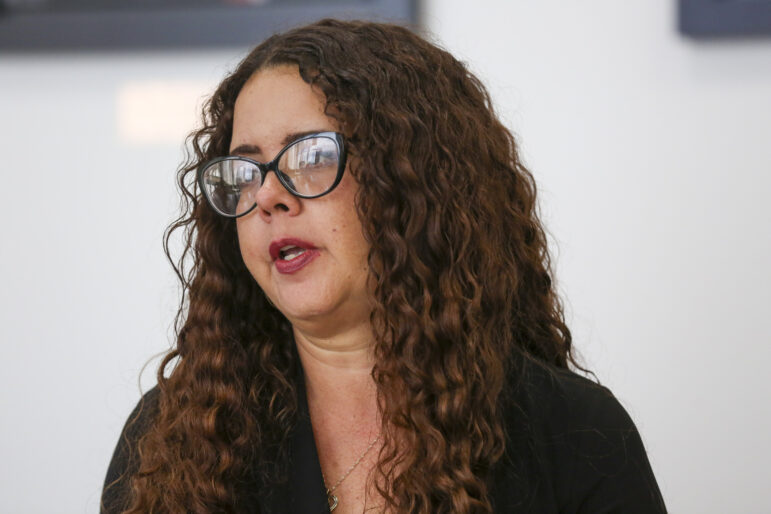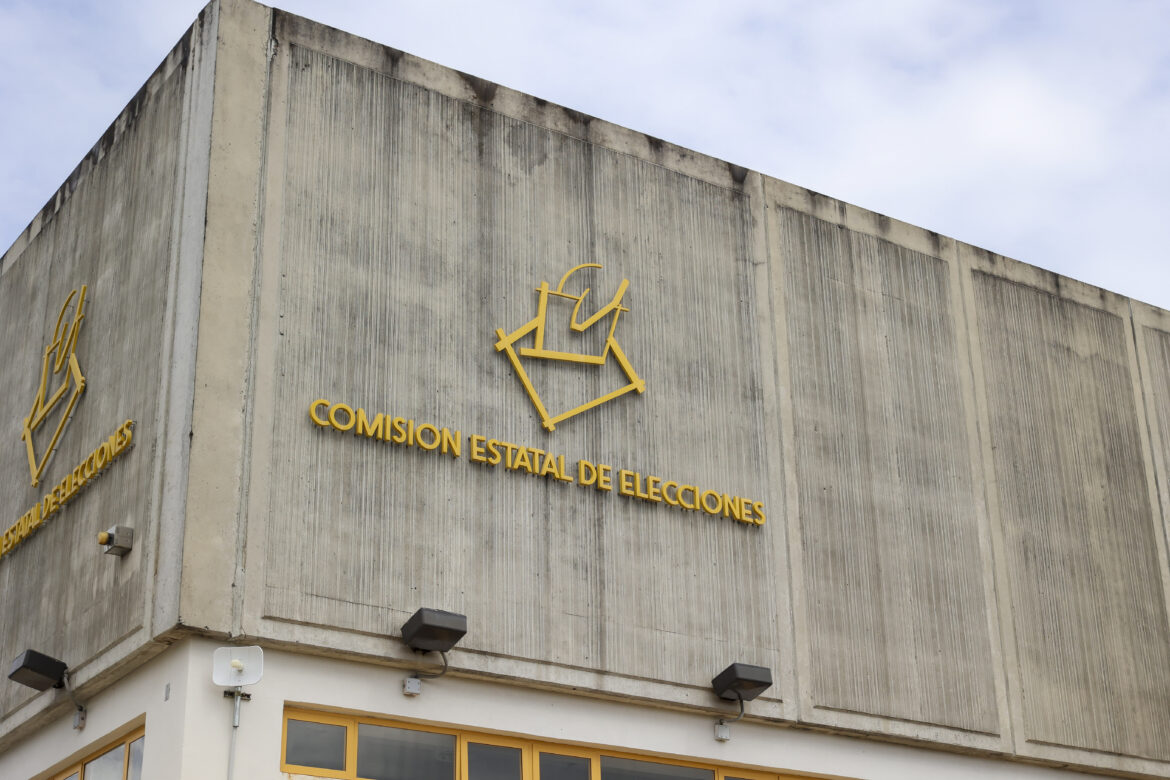The State Elections Commission (CEE, in Spanish) is convinced that most of the shortcomings that took place in the 2020 elections with the early and absentee ballot request forms will be avoided with a web application that will replace part of the paper process, but that it isn’t yet available to the public with only eight weeks left before the primary voter registration deadline and seven months before the general election in November.
The potential number of voters who could request an early vote could exceed 220,000 after the Alternate President of the CEE, Jessika Padilla Rivera, decided this week to add that voters 60 years and older can request an early vote by mail for the November 5 elections. That was the same age allowed for early voting by mail in the last election due to the pandemic. The current Electoral Code, approved in 2020, establishes that age at 80 years or older. In the last elections, 210,896 voters voted in advance or absentee, although more than 227,000 requested these voting ways.
Despite the number of vote-by-mail applications that can be expected, the electronic application for requesting early and absentee voting is not yet available to the public and the Commission missed the opportunity to test it during the upcoming primary events on June 2 and adjust, if necessary, before the general elections in November, during which more than a million people could participate.
This electronic tool will allow the voter to request early or absentee voting through a computer or mobile device.
‘He cheats the most reigns in chaos’
The electronic system is not the only thing delayed ahead of the 2024 primaries and general elections, an investigation by the Center for Investigative Journalism (CPI, in Spanish) found. The early voting form that caused so much confusion in 2020 has yet to be modified. The form’s poor design led some voters to mark several voting methods when they could only choose one.
The rules for early and absentee voting were approved last week. Procedure manuals are still unavailable. Compounding this chain of delays is the lag in acquiring equipment, including another counting machine with the capacity to count these votes quicker.
A month ago, when the CPI visited the Commission, the Director of the Office of Information Systems and Electronic Processing (OSIPE, in Spanish), Eduardo Nieves Cartagena, said the electronic Absentee and Early Voting Administrative Board (JAVAA, in Spanish) system would be launched on February 29. The CEE later told the CPI that the application would be available in March but did not specify the day.

Photo by Gabriel López Albarrán | Centro de Periodismo Investigativo
One of the alleged advantages of this electronic application is to eliminate one of the problems that happened in last elections, when there were voters who registered in two different ways to vote: early and absentee. In addition, there were complaints of duplicate distribution of ballots, which could have resulted in double voting.
“It is an online application […] which is a single record, there will not be a double application, there’s a path to follow already at the system level,” the Director of OSIPE said.
Early voting in 2020 reached record numbers during the COVID-19 pandemic. More than 105,000 people requested early voting at home. Due to the health emergency, people aged 60 or older were allowed to vote by mail. More than 55,000 requested to vote by mail. The CEE also allowed the Permanent Registration Boards (JIP, in Spanish) to manage advance voting in four modalities: at the precinct, at home, by mail, and with easy access at the voting booth. Before 2020, the JIPs recorded only requests for voting at home.
Both decisions caused a series of administrative and managerial problems: inefficiency in identifying the duplication of applications, voters and JAVAA and JIP staff confused with the process, in addition to a lack of office equipment to manage the procedures.
Attorney and experienced politician, Eudaldo Báez Galib, said the upcoming election could become one of the most dangerous precisely due to the delay in implementing technologies and the absence of a campaign to guide voters on how to use them when the electoral process is already so close.
Báez Galib believes there is dissatisfaction and distrust among voters, which has resulted in low electoral participation.
“I’m very worried about the next election because I see that there are a series of implementation problems as a consequence, in part, of digitalization, a consistent decrease in electoral participation, and an Electoral Law that was not amended, when there’s a consensus that it’s a law that caused problems in the last elections,” said Báez Galib.
Meanwhile, electoral law professor Héctor Luis Acevedo said the digital systems should have been ready to be tested and be able to correct possible failures before the start of 2024.
“You cannot, in the same election year, start making technological changes because technology is not perfect,” Acevedo said.
He also questioned the CEE’s Alternate President’s decision allowing voters aged 60 or older to request early voting given that it was precisely one of the factors that caused “the chaos” in the last elections.
“Boxes of ballots appeared; votes disappeared. That resulted in chaos. He who cheats the most reigns in chaos. If they can’t handle what they have now, how are they proposing to expand this?” Acevedo questioned after anticipating that for this election the number of voters who opt for early voting by mail could double since this year this choice was announced earlier, unlike the last election.
According to the U.S. Census Bureau’s Puerto Rico Community Survey, the population aged 60 or older is estimated at 944,507. Puerto Rico has a population of 3.2 million.
Form and procedure manuals have yet to be redesigned
The CEE’s Alternate President and the Director of OSIPE admitted to the CPI that the early vote request form, which must be redesigned, is not ready. As of early January, the form was still in the design stage. It will be available when the tool for requesting early and electronic absentee voting is launched sometime in March, they said.
The lack of staff and materials and poor communication between the JAVAA and other divisions of the CEE were some of the pitfalls in 2020. JAVAA is the CEE division in charge of overseeing these votes from the moment they are requested until they are counted and verified. Since 2020, this division has changed its president at least four times. Brenda Irizarry García was recently appointed on an interim basis.

Photo by Gabriel López Albarrán | Centro de Periodismo Investigativo
Currently, the JAVAA has a president, a secretary and five representatives, one for each political party. Each representative has a deputy staffer, except for the Movimiento Victoria Ciudadana (MVC), which had not yet been named, the CEE confirmed.
For the general elections in November, “about 100 more officials will be needed, 20 for each party. The Commission may increase this amount, according to the need [of each party]. “Everything will depend on the number of requests for absentee voting or early voting that are received,” the CEE said in written statements.
During the 2020 elections, there were only four computers available in JAVAA, the CPI reported then. Now, there are more than 35 computers running, which according to the CEE are enough “for primary events,” but they will have to buy more for the general elections.
Although the CEE said that the eight telephones that JAVAA currently has are enough to handle the daily matters of the electoral events this year, it added that they are working on “the logistics” to meet the need for the general elections.
The CEE said it does not anticipate the use of fax to receive requests for early and absentee voting, which they believe will mostly be received through the web application. Paper applications will also be accepted. In past elections, due to the high volume, it was impossible to handle the applications that arrive via fax, the CPI reported.
“We can have five faxes spitting out paper, and if no one picks them up, what do I do,” said Nieves Cartagena, about what happened in 2020.
But in the 2020 elections there was also a lack of control in applications made via email. That time there were between 17,000 and 21,000 absentee and early voting requests that arrived via JAVAA email. More than a hundred emails related to early and absentee voting were not opened four years ago, the Director of OSIPE admitted to the CPI.
“In the 2024 General Elections, absentee voting applications will be received through regular mail, via e-JAVAA [electronic system], and in person at the locations determined by the Commission,” Regulations for Absentee Voting and Early Voting, approved last February 9, state. Absentee and early voting requests will be processed by JAVAA, while the JIP will oversee early home voting requests. Paper applications submitted at the JIP will be taken to the JAVAA office.
The Permanent Registration Boards have been reduced from 102 to 17. The Electoral Code requires that there be 12. The approval of the JAVAA regulations and procedure manuals were on the President’s Office desk since April 2023, Padilla Rivera said. She said they were not signed due to the uncertainty that an amendment to the Electoral Code would make them obsolete. The manuals, which more precisely establish the evaluation processes and standards for applications, voting and counting of these votes, have not yet been approved, confirmed the Electoral Commissioner of the MVC, Lillian Aponte.



